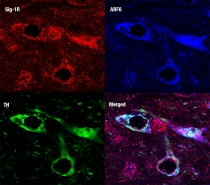Endocannabinoids are naturally occurring molecules in the brain that transfer signals from one cell to another. They are one of the largest networks of receptors in the body and bind to the same site on neurons as THC, the ingredient in marijuana that produces the high.
New preclinical research by scientists at NIDA’s Intramural Research Program, Vanderbilt University Medical Center, and the University of Maryland School of Medicine reveals that the drug cocaine causes neurons to synthesize endocannabinoids that are then enclosed within membrane-bound packages, known as extracellular vesicles. When released from the vesicles, these chemicals stimulate neurological events that can lead to addiction. Several protein interactions are necessary to permit their release. Scientists learned that if you can disrupt the vesicle release, it disrupts the ability of cocaine to trigger endocannabinoid release and increase midbrain dopamine activity, which is known to play a role in reinforcing cocaine use.
Designing drugs or tools to manipulate the protein interactions underlying vesicle release could provide a new way to counter cocaine addiction.
Study:
- Yoki Nakamura, Dilyan I Dryanovski, Yuriko Kimura, Shelley N Jackson, Amina S Woods, Yuko Yasui, Shang-Yi Tsai, Sachin Patel, Daniel P Covey, Tsung-Ping Su, Carl R Lupica. Cocaine-induced endocannabinoid signaling mediated by sigma-1 receptors and extracellular vesicle secretion. eLife.

